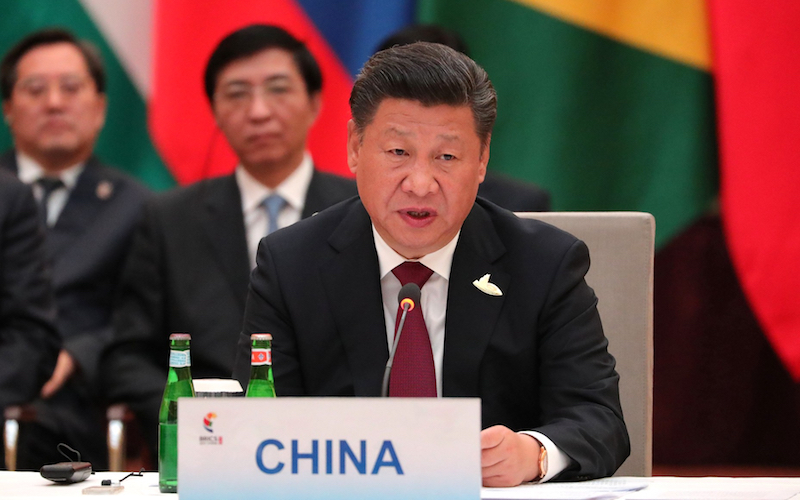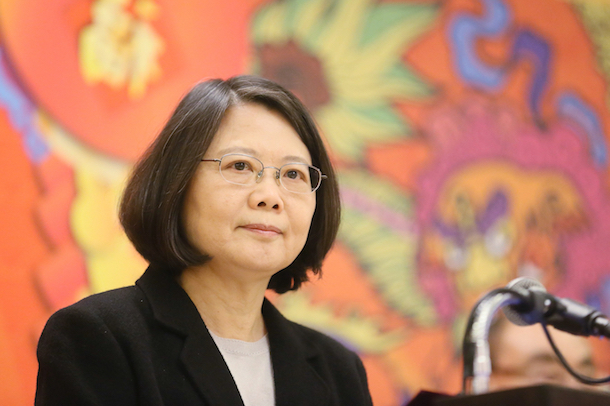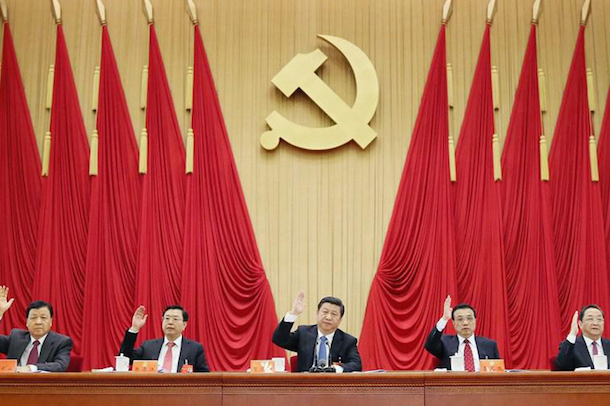
China’s ‘United Front’ Seeks to Undermine U.S. Support for Taiwan
China has never relied on official diplomatic means to exert influence abroad. Instead, it operates a vast, “shadowy” network of “united front” organizations in countries around the world including the United States. This network forms an integral part of China’s overseas propaganda apparatus, cooperating closely with Chinese government agencies in Beijing and with Chinese embassies and consulates abroad. Its chief aim is asserting mainland Chinese territorial claims, particularly on Taiwan, under the deceptive banner of China’s “peaceful reunification.” Other aims include controlling Chinese citizens overseas and suppressing international criticism of China’s poor human rights record.
China’s “united front” activities in the United States are likely illegal under the Foreign Agents Registration Act. Enacted in 1938, FARA requires all persons or groups acting on behalf of a foreign government or other “foreign principal” in the United States to register as such in advance and regularly report their activities, particularly lobbying or propaganda activities aimed at influencing the U.S. political process or public opinion, so that any such activities are carried out openly and transparently. The bipartisan Countering Foreign Propaganda and Disinformation Act, included in the National Defense Authorization Act for Fiscal Year 2017, is aimed at countering such activities globally. Under international law, Chinese consular involvement in these activities is a likely violation of the 1961 Vienna Convention on Diplomatic Relations, which obliges foreign consular officials to respect the laws of the receiving state and forbids foreign consular interference in the internal affairs of the receiving state.
Unfortunately, these laws are rarely enforced, owing either to institutional negligence or to the influence of powerful multinational business interests that prefer not to disclose their activities on behalf of shady overseas interests. Former Donald Trump campaign chairman Paul Manafort and former Trump national security adviser Michael Flynn have become prominent multinational poster-children for FARA non-enforcement. In the case of China, powerful multinational business interests rest on not doing anything to irritate the dictators in Beijing or to upset the apple cart for U.S.-China business operations. Powerful U.S.-China business interests depend a lot more on friendly U.S. relations with Beijing than on a free and autonomous Taiwan, not to mention human rights or the integrity of the U.S. political process.
Three primary Chinese government agencies oversee its “united front” activities abroad: The Communist Party Central Committee’s United Front Work Department (UFWD), the State Council’s Overseas Chinese Affairs Office (OCAO), and the State Council’s Taiwan Affairs Office (TAO). Nominally “non-governmental” front organizations for these agencies include the China Council for the Promotion of Peaceful National Reunification (CCPPNR), the China Overseas Exchange Association (COEA), and the China Overseas Friendship Association (COFA), all led entirely by Chinese Communist Party officials.
For example, current UFWD head, Sun Chunlan, is also president of COFA and executive vice president of CCPPNR, while OCAO head, Qiu Yuanping, is also executive vice president of COEA. CCPPNR President, Yu Zhengsheng and COEA President/CCPPNR Vice President, Han Qide, are likewise ranking Communist Party officials. In addition to his role at CCPPNR, Yu Zhengsheng is a member of the Standing Committee of the Political Bureau of the Communist Party’s Central Committee, the current chairman of the Communist Party-led National Committee of the Chinese People’s Political Consultative Conference (CPPPC), and deputy director of the party-led “Taiwan Affairs Leading Small Group.”
Established under Communist Party guidance as a “united front” organization in 1988, CCPPNR currently boasts some 200 overseas chapters in 90 countries around the world, including 33 China “peaceful reunification” or “peaceful unification” associations in the United States. Despite their clear subsidiary relationship to the Chinese government, these groups are registered as domestic non-profit community organizations if legally registered at all. Their “united front” efforts are targeted primarily at ethnic Chinese communities abroad including Chinese American communities in the United States, which Beijing regards as “overseas Chinese” or “overseas compatriots” of China rather than as citizens of the countries in which they live, and upon which Beijing presumes an expectation of patriotism for the mainland Chinese “motherland.”
Chinese Orgs in the United States
Among CCPPNR-affiliated “united front” organizations in the United States is the National Association for China’s Peaceful Unification (NACPU) in Washington DC, which acts as a loose umbrella organization for similar associations in cities and regions including New York, Chicago, Houston, Los Angeles/Southern California, and San Francisco/Northern California. Except for locality, the names in Chinese of most of these organizations are identical to that of CCPPNR in Beijing, indicating their affiliate relationship; only their English translations differ, for example: CCPPNR (Beijing): 中国和平统一促进会, NACPU (Washington DC): 美国华盛顿中国和平统一促进会, New York Association for the Peaceful Unification of China (see below): 纽约中国和平统一促进会, and the Chinese for Peaceful Unification – Northern California: 北加州中国和平统一促进会.
Like other such associations, NACPU is registered in the District of Columbia as a domestic non-profit organization despite its clear ties to Beijing. NACPU’s current president is Wu Huiqiu, a native of Wuxi in China’s Jiangsu Province who graduated from China Pharmaceutical University in Nanjing and is now a professor at the University of Maryland’s School of Medicine. Wu is also a senior adviser to COEA and a member of the CPPPC National Committee. The NACPU website is registered under Wu’s name, telephone number, and home address in Ellicott City, Maryland. Wu has written at length on NACPU’s mission to “resolutely oppose all forms of ‘Taiwan independence’ separatism.” Given its exclusive target audience of Chinese-speaking expatriates and first-generation immigrants in the United States, NACPU’s website and most of its other public communications are in Chinese language only.
In May 2017, Wu Huiqiu led a delegation of U.S.-based “peaceful reunification” activists to Beijing and Shanghai, meeting with OCAO deputy director Tan Tianxing, Shanghai UFWD deputy minister Zhao Fuxi, and other officials. Wu’s delegation pledged to “resolutely oppose Taiwan separatist activities” and “promote the reunification of the motherland” in the United States. A DC-area “peaceful reunification forum” the same month featured an appearance by Chinese embassy minister Li Kexin, who thanked participants on behalf of the Chinese government for their work opposing Taiwan independence in America’s “overseas Chinese” community.
In December 2016, NACPU held its annual executive meeting in Washington DC. Lamenting the 2016 electoral victory of pro-independence Taiwanese president Tsai-Ing-wen, Wu Huiqiu and other NACPU leaders pledged renewed efforts to “oppose Taiwan independence” and to promote Chinese president Xi Jinping’s authoritarian “Chinese Dream” of national reunification and “rejuvenation” in the United States. In November 2016, Wu and other officers from NACPU and associated organizations attended a joint conference in San Francisco. Also in attendance were Chinese government officials including Ran Wanxiang, UFWD vice minister and vice president of COFA, who stressed the duty of “overseas Chinese” as he saw it “to foster patriotism” for the mainland Chinese “motherland” and of “serving the nation’s great cause of rejuvenation.”

In April 2016, Wu Huiqiu led a delegation of U.S.-based “peaceful reunification” activists to Beijing, meeting with Zhang Baowen, vice chairman of both CCPPNR and the Standing Committee of the National People’s Congress. Said Zhang at the meeting, “The complete reunification of the motherland and the great rejuvenation of the Chinese nation is the common aspiration of all the Chinese people and the fundamental task of CCPPNR and the overseas CCPPNR associations.” On the same visit Wu and his entourage met with OCAO deputy director Tan Tianxing and with Sichuan Province UFWD and CCPPNR officials. In 2015, Wu led a delegation to China and met with Guizhou Province UFWD and CCPPNR officials.
New York
Among NACPU’s sister associations in the United States is the New York Association for the Peaceful Unification of China (NYAPUC). Like NACPU, NYAPUC is registered in New York as a domestic non-profit organization. In a 2011 article for NACPU, NYAPUC’s then-vice president Zhu Lichuang (aka Michael Chu) expressed NACPU’s mission as sees it. This mission according to Zhu is to “go deep into overseas Chinese communities to promote peaceful reunification” and “build a strong team against Taiwan independence,” to “use the internet to push propaganda to Western mainstream society,” and to “build the image of a peaceful, righteous, and awakening China.”
Zhu and former NYAPUC President Hua Junxiong (aka Chuenhsiung Hua, George Hua) have made numerous appearances in state-run mainland Chinese media. In 2009, they appeared together in Beijing for the 60th anniversary of the founding of the People’s Republic of China with an article by Zhu asserting China’s claim on Taiwan for the All-China Federation of Taiwan Compatriots, another Chinese government front organization. In 2010, they appeared together again at CCPPNR protesting President Obama’s meeting with exiled Tibetan spiritual leader the Dalai Lama. In 2012, they appeared yet again in the Chinese Communist Party’s flagship People’s Daily and at CCPPNR leading an anti-Japanese demonstration in New York with pro-Beijing associates Huang Zhecao and Chen Xianzhong promoting China’s claims on the disputed Diaoyu/Senkaku Islands. That same year, Hua spoke at length to the state-run Global Times on his work promoting China’s territorial claims; and in 2013, Hua wrote at length at CCPPNR on his “Chinese dream” and admiration for the Chinese Communist Party.
NYAPUC’s current president is Ma Yue and its current vice president is Jiao Shengan; however, Hua Junxiong and Zhu Lichuang have continued to play leading roles in the organization. In August 2017, Ma Yue and Hua Junxiong both appeared at the UFWD website to praise the People’s Liberation Army as a defender of China’s territorial claims. Hua and Zhu Lichuang both appear at the OCAO and COEA websites as overseas COEA council members; and Zhu appears on a Guizhou provincial government website as a council member with the Guizhou provincial CCPPNR along with numerous Communist Party officials. Both have been frequently seen leading pro-China demonstrations in New York.
Hua Junxiong is a New York realtor who appears also as Chuen-hsiung Hua, C.H. Hua, Chuean Kwa, and George Hua. Hua’s contact information appears frequently in connection with his political activities. Zhu Lichuang operates a travel agency, Asian American Global Travel, and a newspaper, the Asian American Times, in Flushing’s Chinatown in Queens. Zhu’s contact information also appears frequently in connection with his political activities. In addition to his role in NYAPUC, Zhu runs an organization called the “Chinese Anti-Cult World Alliance” from the same location as his businesses in Flushing to assist Beijing in its worldwide persecution of the Falun Gong spiritual practice outlawed in China since 1999. This organization and Zhu himself (as Michael Chu) are currently defendants in a federal civil rights lawsuit for alleged harassment and attacks against Falun Gong practitioners in Flushing.
Zhu Lichuang and NYAPUC have enjoyed a warm relationship with the Chinese consulate-general in New York; and in particular with former consul-general Peng Keyu. In 2008, Peng was caught on tape admitting that he had personally instigated the same violent attacks on Falun Gong practitioners in Flushing connected with Zhu and his organization. Despite calls for Peng to be investigated and expelled from the United States, citing his actions as a violation of U.S. and international law, Peng remained in New York as consul-general until 2011.
Northern California
Other U.S.-based CCPPNR associations include Chinese for Peaceful Unification – Northern California (CPU-NC), located in the San Francisco Bay Area. CPU-NC’s current president is Zou Zhiqiang (aka Fred Tzou), a Bay Area realtor and insurance agent. Zou was noted in Chinese media for his role in leading protests against Taiwanese President Tsai Ing-wen’s January 2017 visit to the Bay Area. The group’s contact information matches that of its current director, Lin Qing (aka Chin Lin) of Cupertino, California.
CPU-NC’s highest-profile member is “honorary president” and prominent San Francisco businesswoman Fang Li Bangqin (aka Florence Fang), the matriarch of a Bay Area “family noted for political hardball,” a former federal official under the first Bush administration, a former owner of the San Francisco Examiner, and a leading figure in the Obama administration’s “100,000 Strong” initiative to promote study in China for U.S. college students, funded in large part by her own Florence Fang Family Foundation. Despite her former role as a U.S. federal official and continuing ties with the U.S. government, Fang has an extensive record of support for Beijing including its claim on Taiwan. Fang is also featured as an overseas director with COEA.

In comments to Chinese media Fang has stated that her “mission” is to “put our ideas about peaceful reunification into mainstream American society” and to “prevent the spread of ‘Taiwan independence’ ideology.” Fang, Lin Qing, and CPU-NC consultant Li Jingfen (aka Betty Yuan, a Bay Area insurance agent) have made numerous appearances at People’s Daily and other Chinese government and state-run media websites, including frequent meetings and photo-ops with high-level Communist Party officials, among whom Fang appears to be something of a celebrity. In these appearances their statements on Taiwan and other issues are virtually indistinguishable from those of the Chinese government.
CPU-NC’s activities are detailed at the group’s website in Chinese. The CPU-NC website is registered under Betty Yuan’s name at her business address in Burlingame, California.
In 2010, Fang Li Bangqin appeared in Beijing for the “Fifth World Conference of Overseas Chinese Friendship Associations” along with NYAPUC vice president Zhu Lichuang. Despite the “friendly” name of the conference, this was an event led entirely by Chinese Communist Party officials; and dedicated entirely to asserting China’s national interests abroad, in particular to “to safeguard China’s national unity and territorial integrity and to realize the complete reunification of China.” Fang and Li Jingfen previously appeared at a 60th anniversary National Day celebration in Beijing in 2009 also attended by Zhu and NYAPUC president Hua Junxiong.
OCAO Deputy Director Tan Tianxing, noted above, met with Fang in 2013 and 2015 and with Lin in 2016 on visits to China. OCAO director and COEA executive Vice President Qiu Yuanping also met with her “old friend” Fang in 2013 and 2014, then again in March 2017. In 2013, TAO spokesman Yang Yi, other Chinese officials, and Hua Junxiong appeared at a “China Peaceful Reunification Americas Summit” hosted by CPU-NC in San Francisco.
Fang, Lin, and other CPU-NC officers have had extensive contact with UFWD officials in China. As early as 2002, Fang met with then-UFWD head Liu Yandong, also a former COFA president, now a vice premier of China, and lead Chinese partner with Fang for the “100,000 Strong” initiative. Fang and Liu met most recently in March 2017. In 2014, Fang met with Hunan provincial UFWD officials. In 2015, Fang met with Wuhan municipal UFWD officials. In December 2016, Lin Qing and former CPU-NC President Li Zhenyu met with Zhejiang provincial UFWD and CCPPNR officials for a “Taiwan Symposium” in Hangzhou emphasizing “anti-independence” activities and “reunification of the motherland.”
Statements from 2006 in People’s Daily say that CPU-NC “identifies itself as a ‘Chinese American’ organization in order to comply with U.S. law” (or perhaps rather to seem in compliance with U.S. law), then roll out a series of Chinese government policies the group was established to support. Like NYAPUC, CPU-NC enjoys a warm relationship with the Chinese consulate-general in San Francisco. Prior to his re-assignment from San Francisco to New York, former consul-general Peng Keyu, noted above, praised CPU-NC for its work promoting China’s foreign policy priorities in the Bay Area. “Over the years,” according to the organization’s news page, “CPU-NC has actively cooperated with the local Chinese consulate to work against ‘Taiwan independence’ and promote national reunification activities, and has some influence in San Francisco’s overseas Chinese community.” In statements from 2013 on her “100,000 Strong” initiative to the Hubei Provincial Federation of Returned Overseas Chinese, Fang Li Bangqin described “American ‘grassroots’ youth” as a “target group” of community members and voters whose ideas and opinions are not yet fully formed and would therefore potentially be open to pro-Beijing ideological influence from their mainland Chinese peers while studying in China. Presumably this influence would include pro-Beijing views on the status of Taiwan and other territories claimed by China. These statements re-appeared at her own Florence Fang Family Foundation website. The 2013 inauguration of a language institute at Beijing University to host U.S. students funded by Fang included prominent appearances by UFWD, OCAO, and other Communist Party officials.
A Need to Enforce Laws
China’s “united front” activities in the United States threaten to undermine America’s support for a free and autonomous Taiwan, and pose a broader challenge to the integrity of the American political process. Countering such activities is the purpose of U.S. laws such as the Foreign Agents Registration Act and the Countering Foreign Propaganda and Disinformation Act. Under international law, the Vienna Convention on Diplomatic Relations also requires foreign consular officials to comply with the laws of the receiving state and forbids foreign consular interference in the internal affairs of the receiving state.
FARA, unfortunately, is a law noted for its “lax enforcement,” as detailed in a September 2016 audit by the U.S. Justice Department. FARA claims to be a “compliance-based” system, which seems in practice to mean “register if you feel like it, at any time that you happen to find convenient, up to and including never.” FARA is also described as a “largely obscure” law, despite the fact that it has been in effect for almost 80 years and that its enforcement would seem to be an important matter of America’s national security and the integrity of American democracy. Given the extensive recent attention to foreign influence (i.e., Russian influence) on America’s political process, perhaps the time has come to raise FARA out of obscurity and begin enforcing it.
In contrast to FARA, the Countering Foreign Propaganda and Disinformation Act is a new law whose effectiveness (or lack thereof) remains to be seen. However, the original text of the law identifies China (in addition to Russia) as a primary source of foreign propaganda inimical to the interests of the United States and its allies. China’s propaganda efforts are clearly focused on promoting mainland Chinese territorial claims and undermining U.S. and international support for Taiwan. If countering such propaganda is indeed a priority for the U.S. government, then countering China’s “united front” activities would seem to deserve serious attention.
Chinese diplomats in the United States also need to be reminded of their obligation under the Vienna Convention on Diplomatic Relations to respect U.S. law and refrain from activities aimed at interfering with the U.S. political process. Any political issues Chinese diplomats wish to address, including the status of Taiwan, may be addressed through proper diplomatic channels with the U.S. State Department. “Compliance-based” systems and multinational business interests notwithstanding, America’s federal law enforcement agencies need to begin enforcing the laws that American taxpayers pay them to enforce.

